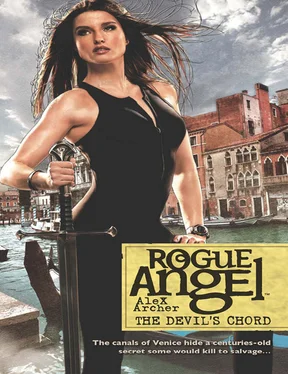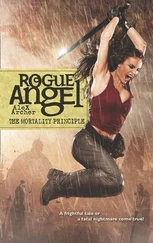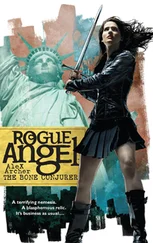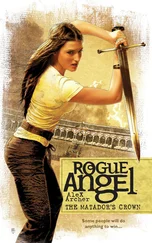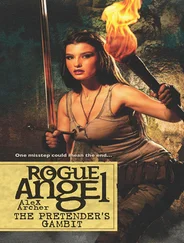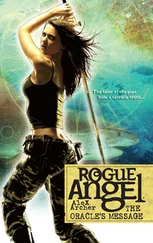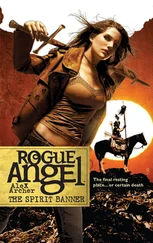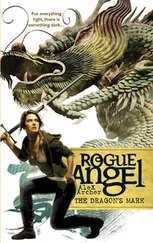Da Vinci’s greatest and most dangerous legacy…
In the midst of a lovers’ quarrel on a Venetian bridge, a pair of art thieves loses a priceless, stolen Lorraine cross to the canal’s murky waters. Suspecting a connection between the cross, Joan of Arc and da Vinci, Annja Creed’s former mentor, Roux, sends the archaeologist to oversee the search for the missing artifact. But someone else knows about the cross…knows enough to kill for it.
Despite several vicious attacks during their underwater expedition, Annja and Roux’s hired diver recovers the cross. But when the diver’s loyalties are called into question and he disappears—along with the treasure—Annja is certain there’s more to the ancient object than Roux is letting on. She soon discovers the cross is only one piece in an intricate enigma—a key that, when combined with a series of musical notes, may unlock one of Leonardo da Vinci’s most fantastical inventions. But the price Annja must pay to stop this key from falling into the wrong hands may be her life.
“Have you heard of the devil’s chord, Annja?”
Interesting conversation change. But Annja could go with it. “Of course. It was a tritone of musical notes that the church banned from being played or used in musical scores in the Middle Ages. It was thought to be evil because it’s dissonant.”
“Diabolus in musica,” Roux recited.
“The devil in music,” Annja translated. “I’m not a musician, but I do know the chord is played quite a bit nowadays. The heavy metal bands pounced on the forbidden motif, liking the evil connotation, but a lot of other musicians have used it, too.”
“It’s not so evil.”
“It’s certainly not worthy of excommunication or death. So what does a bit of music have to do with
a cross that once belonged to Joan of Arc?”
“Nothing. And everything.”
Intrigued, Annja propped her elbows on the table, ready for the rest of the story.
The Devil’s Chord
Alex Archer
Contents
Chapter 1
Chapter 2
Chapter 3
Chapter 4
Chapter 5
Chapter 6
Chapter 7
Chapter 8
Chapter 9
Chapter 10
Chapter 11
Chapter 12
Chapter 13
Chapter 14
Chapter 15
Chapter 16
Chapter 17
Chapter 18
Chapter 19
Chapter 20
Chapter 21
Chapter 22
Chapter 23
Chapter 24
Chapter 25
Chapter 26
Chapter 27
Chapter 28
Chapter 29
Chapter 30
Chapter 31
Chapter 32
Chapter 33
Chapter 1
Milan, 1488
The night was young and the tavern stank like a hog barn, which was much preferable to the cart of rotting fish parked outside his studio near the park. Leonardo had sought escape from the stench. The tavern’s atmosphere of soused cheer always sharpened his senses. There was so much to take in and to record.
Upon choosing a seat, he’d sketched a study of the tavern keeper’s face as it had segued through the various stages of reception, duty and amiability. He’d just finished the resentful sneer the keeper cast toward the boastful gent adorned in rich velvet and Venetian lace.
When he’d spied the tall, lean man with a tankard in hand casting about for a place to sit, Leonardo had invited him to join him. Pleased by the invitation, the man sat across from him at the rough-hewn wood table. He had an open purse and enjoyed the taste of the local ale. And he was very willing to share that appetite with Leonardo.
Leonardo da Vinci sat back against the beam in the center of the tavern—his usual spot—and produced the notebook he always carried with him
“Do you mind?” he asked the man who had introduced himself as Roux. “I like to record things,” he explained, pointing at the notebook with his red chalk pencil. “Whatever passes before my eyes. People, places, things. Emotions. Designs. Ideas.”
“Don’t mind at all.” Roux tilted back the ale stein. The man had a French accent, but his sun-browned skin suggested Spanish heritage, perhaps. Leonardo had not visited France—or Spain, for that matter—enough to pick out the various dialects. “But how does one record emotions? Is it possible to draw them?”
“Oh, yes.”
Leonardo sketched the beginning lines to the old man’s face. His long Roman nose showed a commanding presence and intelligence. His skin tone promised he rode horses more often than luxuriating idly in a carriage. His eyebrows were darker than his silver-white hair, drawing attention from the lines that creased at the corners of his eyes.
“I like to capture the human face as a person experiences many emotions,” he explained. “Angst. Worry. Joy. Curiosity. Happiness shows first in the eyes. Drunkenness tends to obliterate the finer details of emotion. And worship. Ah, worship.”
“I’ll give you drunkenness after a few more steins.”
The man signaled to the serving wench, and arms loaded with a pitcher and empty tankards, she nodded that she’d return to their table when she was able.
“I write everything down,” Leonardo added as he swept his hand across the paper. “There is no order,” he continued. “But every detail I note engages my thoughts and hopefully inspires me. You see, if I don’t put it down on paper, then I can’t make room for new ideas. It’s so full.” He paused to tap his skull. “My mind. And after I’ve removed one idea, there are always new ones to fill the space.”
“You’ve a restless mind. Always thought an artist would be—I don’t know—serene. Lost in the creation of his next work.”
“But that’s it exactly,” Leonardo said. Enthusiasm had him shifting in his seat and he leaned forward to study the wrinkles that dotted the edges of Roux’s eyes. “I do get lost. If I didn’t have many other notions and interests, I might never take on the next project.”
Of course, sometimes it seemed there were simply too many projects jostling for his attention. It was entirely his own fault. He followed his muse. An erratic muse.
He tugged out his purse, which had a few coins in it but more usually held his red chalk and a lampblack pencil. Inside he also kept the key to his special box and a few cards onto which he’d sketched the Lorraine cross he’d recently finished enhancing. Or rather, altering magnificently.
Leonardo set the cards on the table beside the wilted calfskin purse, and when the wench handed him his refilled stein, he thanked her and then ignored the spirits in favor of his subject.
“I’ve seen a cross like that before,” Roux commented. “May I?” He took the sketch with his long, callus-roughened fingers. The cross featured parallel crossbars placed at equal distance on the single center bar. “Referred to as a Lorraine cross?”
“Yes. It’s a sketch of a piece I own. A gift from René d’Anjou. He was a friend. Another Frenchman,” Leonardo added, since he’d decided Roux’s accent was definitely from France.
“I knew the Count d’Anjou. Died a few years ago at his home in Aix-en-Provence. Good King René—isn’t that what they called him?”
Leonardo nodded.
“And his mother, Yolande of Aragon. She was kind and strong. A fierce woman. One of Jeanne d’Arc’s tutors.”
“Is that so?” Looking up from the sketch, the pencil gripped loosely now, Leonardo granted the man his complete attention. René had never talked much about his family. He was possessed of a mind as busy as Leonardo’s own and always jumped from one topic to the other with frequency. “Tell me more.”
Roux shrugged. “I got to know him when he rode in the siege on Orléans in 1429.”
“He and Jeanne were close,” Leonardo stated.
There were rumors whispered that René d’Anjou and the Maid of Orléans had been lovers.
Читать дальше
